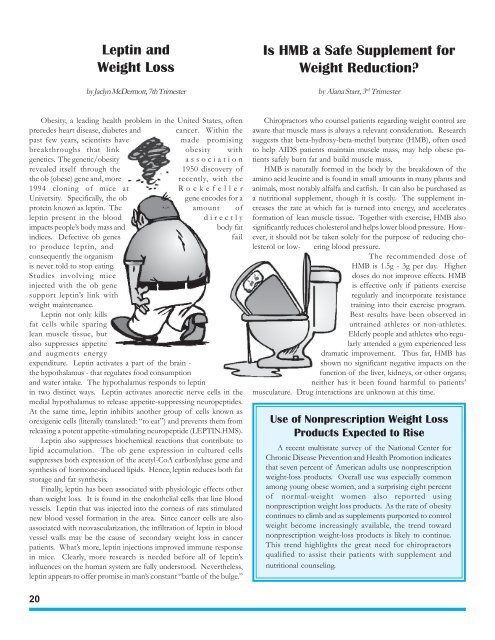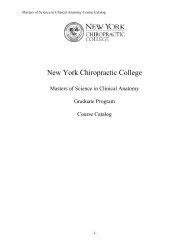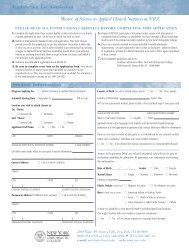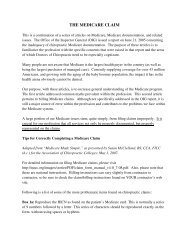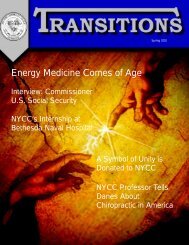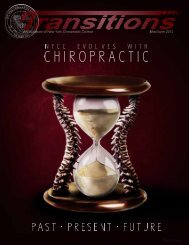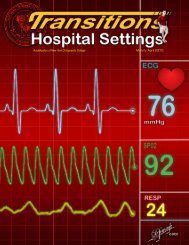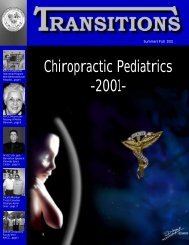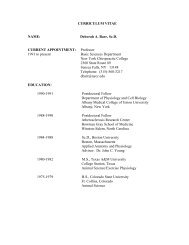2502 NYCC TRANS FINAL2 - New York Chiropractic College
2502 NYCC TRANS FINAL2 - New York Chiropractic College
2502 NYCC TRANS FINAL2 - New York Chiropractic College
Create successful ePaper yourself
Turn your PDF publications into a flip-book with our unique Google optimized e-Paper software.
Leptin and<br />
Weight Loss<br />
by Jaclyn McDermott, 7th Trimester<br />
Is HMB a Safe Supplement for<br />
Weight Reduction?<br />
by Alana Starr, 3 rd Trimester<br />
Obesity, a leading health problem in the United States, often<br />
precedes heart disease, diabetes and cancer. Within the<br />
past few years, scientists have<br />
made promising<br />
breakthroughs that link obesity with<br />
genetics. The genetic/obesity<br />
association<br />
revealed itself through the<br />
1950 discovery of<br />
the ob (obese) gene and, more<br />
recently, with the<br />
1994 cloning of mice at R o c k efeller<br />
University. Specifically, the ob<br />
gene encodes for a<br />
protein known as leptin. The amount of<br />
leptin present in the blood<br />
d i rectly<br />
impacts people’s body mass and<br />
body fat<br />
indices. Defective ob genes<br />
fail<br />
to produce leptin, and<br />
consequently the organism<br />
is never told to stop eating.<br />
Studies involving mice<br />
injected with the ob gene<br />
support leptin’s link with<br />
weight maintenance.<br />
Leptin not only kills<br />
fat cells while sparing<br />
lean muscle tissue, but<br />
also suppresses appetite<br />
and augments energy<br />
expenditure. Leptin activates a part of the brain -<br />
the hypothalamus - that regulates food consumption<br />
and water intake. The hypothalamus responds to leptin<br />
in two distinct ways. Leptin activates anorectic nerve cells in the<br />
medial hypothalamus to release appetite-suppressing neuropeptides.<br />
At the same time, leptin inhibits another group of cells known as<br />
orexigenic cells (literally translated: “to eat”) and prevents them from<br />
releasing a potent appetite-stimulating neuropeptide (LEPTIN.HMS).<br />
Leptin also suppresses biochemical reactions that contribute to<br />
lipid accumulation. The ob gene expression in cultured cells<br />
suppresses both expression of the acetyl-CoA carboxlylase gene and<br />
synthesis of hormone-induced lipids. Hence, leptin reduces both fat<br />
storage and fat synthesis.<br />
Finally, leptin has been associated with physiologic effects other<br />
than weight loss. It is found in the endothelial cells that line blood<br />
vessels. Leptin that was injected into the corneas of rats stimulated<br />
new blood vessel formation in the area. Since cancer cells are also<br />
associated with neovascularization, the infiltration of leptin in blood<br />
vessel walls may be the cause of secondary weight loss in cancer<br />
patients. What’s more, leptin injections improved immune response<br />
in mice. Clearly, more research is needed before all of leptin’s<br />
influences on the human system are fully understood. Nevertheless,<br />
leptin appears to offer promise in man’s constant “battle of the bulge.”<br />
Chiropractors who counsel patients regarding weight control are<br />
aware that muscle mass is always a relevant consideration. Research<br />
suggests that beta-hydroxy-beta-methyl butyrate (HMB), often used<br />
to help AIDS patients maintain muscle mass, may help obese patients<br />
safely burn fat and build muscle mass.<br />
HMB is naturally formed in the body by the breakdown of the<br />
amino acid leucine and is found in small amounts in many plants and<br />
animals, most notably alfalfa and catfish. It can also be purchased as<br />
a nutritional supplement, though it is costly. The supplement increases<br />
the rate at which fat is turned into energy, and accelerates<br />
formation of lean muscle tissue. Together with exercise, HMB also<br />
significantly reduces cholesterol and helps lower blood pressure. However,<br />
it should not be taken solely for the purpose of reducing cholesterol<br />
or low- ering blood pressure.<br />
The recommended dose of<br />
HMB is 1.5g - 3g per day. Higher<br />
doses do not improve effects. HMB<br />
is effective only if patients exercise<br />
regularly and incorporate resistance<br />
training into their exercise program.<br />
Best results have been observed in<br />
untrained athletes or non-athletes.<br />
Elderly people and athletes who regularly<br />
attended a gym experienced less<br />
dramatic improvement. Thus far, HMB has<br />
shown no significant negative impacts on the<br />
function of the liver, kidneys, or other organs;<br />
neither has it been found harmful to patients’<br />
musculature. Drug interactions are unknown at this time.<br />
Use of Nonprescription Weight Loss<br />
Products Expected to Rise<br />
A recent multistate survey of the National Center for<br />
Chronic Disease Prevention and Health Promotion indicates<br />
that seven percent of American adults use nonprescription<br />
weight-loss products. Overall use was especially common<br />
among young obese women, and a surprising eight percent<br />
of normal-weight women also reported using<br />
nonprescription weight loss products. As the rate of obesity<br />
continues to climb and as supplements purported to control<br />
weight become increasingly available, the trend toward<br />
nonprescription weight-loss products is likely to continue.<br />
This trend highlights the great need for chiropractors<br />
qualified to assist their patients with supplement and<br />
nutritional counseling.<br />
20


